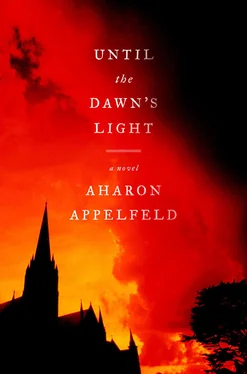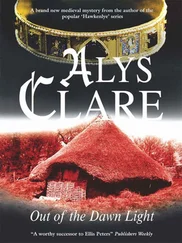“Slut,” she hissed, when she learned of Blanca’s marriage.
DAY BY DAY the light grew stronger, and red poppies covered the riverbank. The sight of the flowers reminded Blanca of summer vacations when she was Otto’s age and her parents were young. Even then the fear of death would assail her in the middle of the day. She kept this a secret and told no one. Sometimes, before going to sleep, she would ask her mother not to put out the light. Her mother, a thin and fragile woman, used to whisper, “There’s nothing to be afraid of, dear; darkness isn’t anything, just a color. At your age it’s not fitting to sleep with the light on.”
In time Blanca confessed: “I’m afraid.”
“These are just momentary fears, dear. They’ll pass very quickly.”
Later, the fear of death left her, but another fear came to dwell in its place, a fear of people. Blanca would hide in the closet or under her bed, and Johanna, the housekeeper, would get down on her knees and whisper, “Where’s my squirrel, where’s my sweet child?” Hearing her whisper, Blanca would chuckle and emerge from her hiding place.
Then Blanca’s mother fell ill. She was just thirty-five, and Blanca was still a young girl. For years they dragged her from sanitarium to sanitarium, from doctor to doctor. She would return from those trips wan and pale, her eyes sunken into their sockets, an involuntary smile trembling on her lips. Blanca wasn’t allowed to go into her room. She would stand in the doorway and stare at her.
“How are you feeling, dear?” Her mother would address her as though she were no longer in this world.
“Fine, Mama.”
“And how’s school?”
“I got ‘Excellent’ on my arithmetic homework.”
Upon hearing those words, her mother would close her eyes and spread her hands on the white sheet.
After a while Blanca’s mother no longer returned home, except for short intervals. During vacations, Blanca and her father used to go to the mountains to visit her. Those hasty visits, once in the winter and once in the summer, were seared in her memory with burning clarity. In the summer, her father would rent a room near the sanitarium, and they would visit her mother together twice a day. On warm days, her mother would get out of bed, and they would sit in the garden. Blanca noticed that the flower beds were well tended and the grass was trimmed. Sometimes Blanca would show her mother her notebooks. They were neat, and the teacher’s “Excellent” sparkled in them.
Blanca’s father was a tall, thin man of few words. He would answer all of Blanca’s questions distractedly. “True, you’re right,” he would say. He made his living from a stationery store, which he and a cousin ran as partners. The cousin, Dachs, a fun-loving bachelor, was his total opposite. Whenever they were together, they quarreled. More than once they were about to sell the store and dissolve the partnership, but at the last minute they would make up, and everything reverted to the old order. So it was for years. Blanca’s father hated the store, and his face expressed that hatred. With every passing year his face grew more wizened.
Grandma Carole didn’t like Blanca’s father. She used to say that all the evils that had befallen her daughter were only because of him. Once, when Blanca was five, Grandma Carole spoke harshly to him about his squandered inheritance and about the way he neglected the store and didn’t support his family. Blanca’s father sat in an armchair and didn’t utter a word as Grandma Carole stood there and listed transgression after transgression. Finally he rose to his feet and, shouting louder than she had ever heard anyone shout, said, “Get out of here, you witch!” Grandma Carole responded in an even more terrifying way: she stretched out her neck and screamed, “Here’s my throat. Cut it!”
For a long time after that episode, Blanca was not at ease in her father’s company. Her mother tried to make her forget that dreadful episode, saying that it was only a momentary outburst. Papa was a good man, she said, one who liked people, and he wouldn’t hurt a fly.
“MAMA!” OTTO CRIED OUT.
“What, dear?”
“How old are you?”
“Twenty-three.”
“So old?”
Blanca laughed, hugged him, and kissed his head.
They’d been living in this enchanted dwelling for a week now. The low ceiling was held up by thick wooden beams. The windows in the rooms were long and narrow, except for the kitchen window; it was broad and protruded outward, bringing the garden and the river inside. During the long afternoon hours, Blanca sat in the kitchen and happily surveyed all the silent things surrounding her. When she stood up, she felt heavy, and her legs wouldn’t take her far.
At that hour Otto would be bent over his treasures, moving them from place to place. Every day he brought pebbles, dry branches, and shells home from the river. He would place them in baskets that were scattered about the house. Later, he would gather them around him. Blanca didn’t disturb him. She let him immerse himself in his magic. Sometimes he would get tired in the middle of some enchantment, sink down, and go to sleep. When the darkness fell, she would pick him up in her arms and lay him on the broad bed.
It was summer, and the sunset glowed until late at night. Sometimes, for reasons that Blanca didn’t understand, Otto would put aside his magical toys and come to sit at her side. Blanca would split open a watermelon or rinse a plate of cherries, and they would eat them together. The evening light would crown his forehead and eyes. His questions were many, little expressions of astonishment.
“Why did the Jews kill Jesus?” he asked one evening, surprising her.
“Who told you that nonsense?” The question made Blanca jump up.
“Aunt Brunhilde.”
“It’s absolute nonsense. As for Aunt Brunhilde, she’s a bitter, fanatical woman who thinks that anything that isn’t Christian is worthless. Fanaticism is despicable, and we must always condemn it. Everyone should live according to his own faith, and nobody should criticize someone else’s life. You understand me, dear, right?”
Blanca didn’t usually raise her voice. Her patience with Otto was limitless. She listened to his questions attentively and only made comments that would enlarge his mind. But this time his question annoyed her. Otto was surprised by her reaction.
“I’m sorry,” he said, and hung his head.
“Forgive me, dear,” Blanca said. “But there are things that one mustn’t pass over in silence. What Aunt Brunhilde told you is a lie, and we can’t keep quiet about it. You can forgive a little lie, but you have to raise your voice and protest against a big lie. We can’t be afraid. Truth comes before fear. Do you understand me?”
Otto didn’t understand her torrent of words and didn’t know what to say.
The days were transparent, like the waters of the Dessel, and Blanca’s short life now seemed long to her, having been joined to another, unfamiliar life. Sometimes it seemed to her that she had always been drawn to this place, and now that she had finally arrived, she would not soon leave.
“You know, dear, that your mother is a Jewish woman,” said Blanca, and immediately felt that a boulder had been rolled off her heart.
“That’s very surprising, Mama.”
“Why?”
“I thought Jews were different.”
“How?”
“I don’t know.”
Blanca sat in the armchair, and Otto sat opposite her in the rocking chair. He sat straight, and his eyes were full of wonder.
“Are you sorry?” she said.
“I don’t want to think about it,” he said, and looked right into her eyes.
The evening darkness slowly descended, the heat dissipated, and a moist breeze rose from the water. It seemed to Blanca that she had not done well to reveal the secret to him, and she was about to say, I was only joking , but she realized that what was done could not be undone.
Читать дальше








![Traudl Junge - Hitler's Last Secretary - A Firsthand Account of Life with Hitler [aka Until the Final Hour]](/books/416681/traudl-junge-hitler-s-last-secretary-a-firsthand-thumb.webp)



